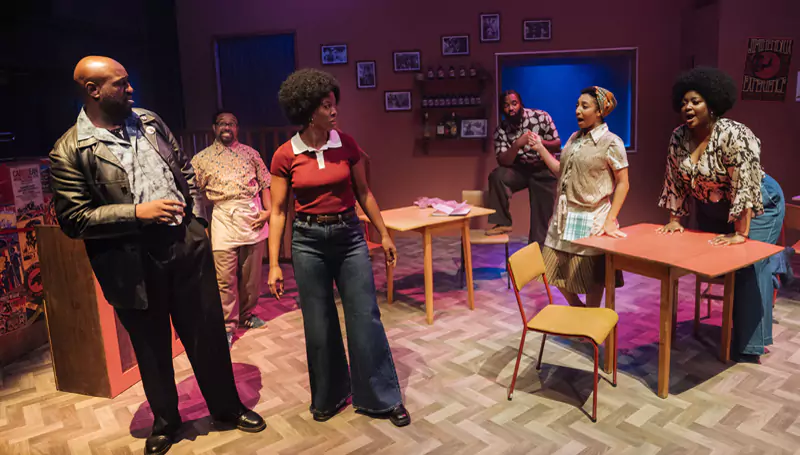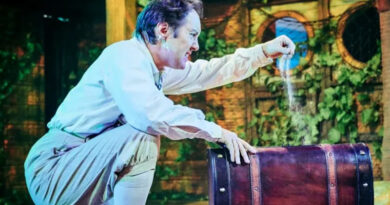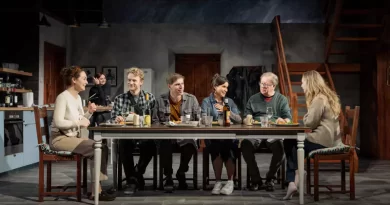“Black Power Desk”, Brixton House
Jeremy Malies in South London
9 September 2025
★★★★
If there are playwriting equivalents of the Newtonian laws of physics then this new piece obeys them. Every character has plausibility and depth, is fully integrated into the brisk but credible plot, and is depicted against a factual background of social injustice that enthused the audience on press night. The front rows screamed at the villains and there were intakes of breath at a betrayal during a plot twist.
Urielle Klein-Mekongo takes three trials of London-based Black activists in the Seventies, most notably the Mangrove Nine in Notting Hill, to create a fine drama spanning the injustices behind the militancy, semi-fictionalized key players, and what struck me as an authentic social backdrop.
“I was never taught about Black women in British history. So I decided to do something about it …” says Klein-Mekongo. But her approach is never over-intense; nothing is obvious, preachy, or box-ticking. For every moment of political theory there is a convincing love scene, for every reference to the contemporary legal system there is a clash of values between two sisters or a discussion of toxic masculinity.
Is it a musical or a play with music? Black Power Desk is genre-bending perhaps and the songs always flow logically from preceding dialogue. Nobody simply rattles out a set-piece ballad and yet it’s the songs that are the most memorable aspect with Rochelle Rose as Celia setting the standard. She disarms us with a gospel reflection on a plot turn that is best kept under wraps. Gerel Falconer’s lyrics here hit a high point for poignancy and idiom.
“Black Power Desk” was the name given to the Met Police’s specialized unit (featuring much undercover surveillance) that formed the state’s response to concerns about the rise of the Black Power movement which was inspired in part by the Black Panther Party in the United States. Three of the characters here are white police officers, with Gbolahan Obisesan’s fluid unfussy direction making good use of a split-level set to show their station and incident unit. The set by Natalie Pryce even becomes a prison visiting area later.
The creative team around Obisesan all excel with Tony Gale capturing the period with his sound. This is never formulaic and while it’s inevitable that his design should include Enoch Powell’s “Rivers of Blood” speech we hear only a snippet before there is another well-chosen radio item or police broadcast.
Everything moves at pace. Obisesan unwraps an ecosystem in which Klein-Mekongo has changed actual Notting Hill locations to her own backyard of Harlesden in northwest London. There is a trio of live musicians with Tendai Humphrey Sitima on guitar and Romarna Campbell on drums. They are propelled by Daniel Taylor extracting colour from a modest-sized keyboard. I recognized genres such as reggae, gospel, and soul. Grime, which dates from the early 2000s, struck me as an unnecessary inclusion by composer Renell Shaw. Everything musical was so spontaneous that each performance will have a slightly different pace and flavour.
The view taken of race relations between Black, primarily Jamaican, immigrants and white Londoners (exclusively the police here – there are no white civilian characters) struck me as gloomy but my instinct is to trust Klein-Mekongo. And yet you wonder why anti-racist white Scottish barrister Ian Macdonald QC who defended some of the Mangrove Nine does not receive a mention. Similarly, with cricketers from the Caribbean touring every few years and the first Black professional footballers playing in England, I thought that friendship through sport might have been touched upon.
Veronica Carabai plays Celia’s activist sister, Dina, and it’s hardly a spoiler to say that she ends up in HM Prison Holloway. The clash between a sister who embraces political struggle and one who shuns it is classic dramatic conflict, but the quality of the writing ensures that this is fresh and full of surprises. Klein-Mekongo knows exactly when to switch from macro to micro, a hate-filled street to a fraught interior scene be it between the sisters or mixed ethnicity lovers. Her writing is stylish but disciplined, impassioned but always lucid.
Black Power Desk transfers to Warwick Arts Centre, Salford Lowry, and Birmingham Hippodrome.









